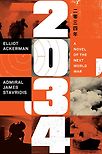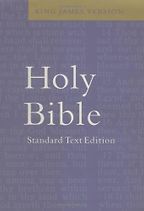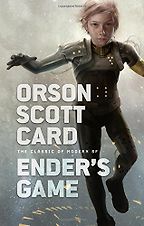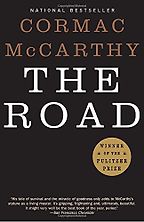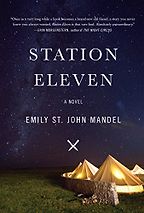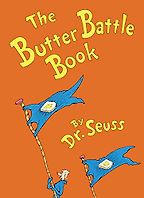You’ve recommended five books of apocalyptic fiction. How do you define and see the field?
Apocalyptic fiction is pretty broad. I think it includes any work of literature that deals with the end of humanity or a complete reordering of human systems.
Please tell me about your addition to the literature. Please tell me about 2034.
2034 is a work of speculative fiction that I collaborated on with Jim Stavridis, a retired US Navy admiral whose last position was as Supreme Allied Commander Europe, the American military officer who leads NATO. 2034 is a work of fiction that imagines what would happen if the US went to war with China in the aforementioned year, including the global conflict and reordering that would follow.
I want to ask you more about 2034 later, but let’s talk about the books you’ve recommended first, beginning with a work that really begat a lot of apocalyptic fiction. Why have you recommended the King James Bible?
One of the reasons that we are drawn to apocalyptic fiction is because it deals with death, not just the death of the individual, but the end of humanity and the end of everything. One of the things that gives life meaning is death. If there was no end to point to, life would feel less precious. So much of the Bible, the Koran, the Torah and all of the canonical religious texts are about giving meaning to death and showing us how to live our lives. Plus, the Bible does include incarnations of what the end of times looks like. So, if you’re going to talk about apocalyptic fiction, the Bible is a root text.
The official apocalypse in the book of Revelation gives people to this day a lot of enthusiasm for the end of times. There’s also the flood, a punishment for humanity’s hubris, that leads to the restart of the world. How do the varied Biblical apocalypse stories affect literature?
There are different types of apocalypse. The depiction of a Judgment Day that comes at the end of the Bible is the canonical story of religious redemption. There are examples of more vengeful apocalypses, like Sodom and Gomorrah, where God unleashes his wrath on humanity. Then there are stories about the reordering of civilization like the deliverance out of Egypt. These are just a few of the many different directions for apocalypse stories suggested in the Bible.
Biblical apocalypse stories, like most modern apocalyptic fictions, are pretty sensational. The parting of the seas and Judgement Day are big thrills. Does the sensational aspect of apocalypse stories explain a big part of their appeal?
Yes. But the way apocalyptic stories are received depends on the historical moment. So, if you were living in the 14th century, when the Black Death was devastating Europe, these apocalyptic stories wouldn’t seem sensational because back then death was all around and the Judgement Day felt like it was imminent. And works of apocalyptic fiction that dealt with disease, which seemed very fanciful to me when I read them a few years ago, now seem like they were ripped from the headlines. So context really matters.
True. Your next book is Nebula and Hugo Award-winning Ender’s Game by Orson Scott Card.
Ender’s Game is a science fiction novel that has always been near and dear to my heart. I read it when I was a boy, several times, and I’ve read it with my own children. I put it in the category of being an apocalyptic novel because it deals with war between humanity and what Card calls “the buggers.” That conflict is one in which those two societies are locked in a struggle that will end in one of their demises. And so it’s a book about the end of a civilization, but it’s also a book about war.
“Serving in places like Iraq and Afghanistan…you come to see how very tenuous society is”
The protagonist of the novel is a boy named Ender Wiggin. In the novel, you travel with him, from about the age of seven to nine or ten years old. The premise of the book is that it takes a childlike understanding of emotion and a childlike intelligence to become the type of facile military commander that humanity needs in order to anticipate the actions of an adversary that’s trying to destroy us. So Ender becomes the general in this war.
Ender’s Game is on the US Marine Corps’ professional reading list. You were a Marine. You received a Purple Heart for injuries you incurred during five tours of duty in Iraq and Afghanistan. You were awarded the Silver Star and the Bronze Star for valor. Does war teach you about apocalypse and does apocalyptic fiction tell us anything about what it is like to serve in a conflict zone?
Fiction teaches you and war forces you to learn empathy, much the same way Ender does. When you go to war, when you are in combat, you become locked in a shadow dance with your adversary. This was certainly my experience. You spend a lot of time thinking about and trying to anticipate your adversaries’ actions. To survive and to win you must understand who they are and what they might do at any moment. So you’re consistently engaged in exercising empathy. And if you’re a good soldier, you’ll start to appreciate your adversary and develop sympathy for them.
Ender says, “When I truly understand my enemy, understand him well enough to defeat him, then in that very moment, I also love him.” You are locked in a very intimate relationship with them. And after a while, you come to appreciate who they are, despite all the differences that might exist between you. And you come to realize that the two of you have defined each other through this experience. And to a certain degree a deep, profound understanding exists between you, an intimacy that is like love.
Get the weekly Five Books newsletter
Specific to your question about how war allows you to imagine an apocalypse: Serving in places like Iraq and Afghanistan, which have been devastated by war, you come to see how very tenuous society is and how very tenuous peace is and how tenuous the civilizations that we live in are as well.
Next, the novel that won Cormac McCarthy the Pulitzer Prize. Please tell us about The Road.
The Road is a very spare novel by Cormac McCarthy. Humanity has been wiped out, for the most part. There’s a man and his son traveling on a road to try to get to where it’s rumored that sprouts of civilization are starting to grow again. It’s a very minimalistic book. It’s very sparse and elegiac, just with those two characters.
The post-apocalyptic struggle for survival strengthens the father-son relationship. It seems like a lot of apocalyptic fictions strip away the trappings of civilization to focus on elemental feelings. Is that a common thread?
Apocalyptic fiction can lend itself to that technique because post-apocalyptic plots are about the destruction of civilization. That’s very much what McCarthy does in The Road. It’s just the man, the boy, the road and the journey. The tone of the book matches its apocalyptic themes. But there’s also something very redemptive in the book because it spotlights our primal desire to carry on from one generation to the next quite beautifully.
The Arthur C. Clarke Award-winner Station Eleven by Emily St. John Mandel is your next choice.
This book speaks to this moment. It imagines a pandemic that’s far more devastating than the one that we’re living in right now. A group of traveling actors, who are getting ready to put on a Shakespeare play, are also trying to get to an airfield where it’s rumored that civilization is enduring. So, the construct of Stations Eleven is similar to The Road, but there’s more going on. It’s a very dark book, with a broader cast of characters. There’s more of an active focus on the essential role that culture plays in our civilization. But it also speaks to the importance of maintaining community in dark and challenging times; that’s something we’ve all been living with, as we’ve all been forced into isolation.
Given our recent experience with pandemics, what does the author get right and wrong about a society under existential threats?
One of the things that Mandel gets just right in the book is that crises tend to accentuate negative and positive trends. I’ve seen this in my own experience, in war. In a pandemic or a war, you see people at their absolute best, acting heroically. And in crisis and conflict you also see people at their most selfish and their most depraved. These situations widen the spectrum on what we are capable of. The most amazing acts of courage and empathy that I’ve seen, I’ve seen in war. And the most depraved things that I’ve ever seen in my life are also things I saw in war.
War flings open the aperture of human experience. I see something similar in this pandemic in the community I live in. You see something similar in the pages of many of these apocalyptic novels.
That’s one of the things that defines an apocalyptic novel — these extreme scenarios widen the possibility of what characters are capable of doing.
Finally, a family favorite, at least in my house. I believe it’s the best Seuss. Why have you selected The Butter Battle Book?*
Of all the books on my list, this is actually my favorite. I read it as a boy and I’ve read it to my children. The Butter Battle Book, by Dr. Seuss, is an allegory for nuclear apocalypse written during the Cold War. The premise of the book is that the Zooks eat their bread with the butter side up and the Yooks eat their bread with the butter side down. The Butter Battle Book traces the story of how this trifling difference leads to a war that starts with slingshots, then escalates with ever more elaborate weapons until the last contraption, a gumball-size bomb built by both sides, has the power to annihilate all life on the other side of the wall. The book ends with a Zook and a Yook staring at each other across the wall, on the brink of mutually assured destruction, poised to drop their bombs.
It’s a great intro to apocalyptic fiction books. My kids love Seuss’s inventive weapons and both the absurdity and the thrill of the butter battle. What does this book convey about the appeal of apocalyptic fiction?
Apocalypse stories almost always address what led humanity to the brink of extinction. So, they prompt writers to take on sweeping themes. All of these books are bringing to light big trends with how humans behave towards one another individually, as communities and under different conditions. So, I’ve always been drawn to these books because they take on the big things.
Apocalypse fictions leverage the predominant cultural fear of the time. What are you and Admiral Stavridis trying to convey in 2034 about what the world should fear?
2034 is about what a catastrophic war would look like. Our hope is that readers, having inhabited that world, will realize that war with China is something we want to avoid. If you look at the Cold War, the reason that it stayed cold, the reason why nuclear arsenals were never used, is because both the United States and the Soviets could very clearly imagine what would happen if we went to war. Because they knew how horrible it would be, national security actors on both sides prevented catastrophe.
Five Books interviews are expensive to produce. If you're enjoying this interview, please support us by donating a small amount.
Many of the great national security catastrophes of the last hundred years — for instance, the Pearl Harbor and September 11th attacks — were the result of failures of imagination. The September 11th Commission explicitly concluded that. You could say the same thing about the Covid-19 pandemic. None of us imagined this. We need to actively imagine what could happen to prevent it from happening. If we consider how entanglements can lead to conflagrations and catastrophe, and our adversaries do too, we’re less likely to sleepwalk into wars. Imagination is a national security imperative.
* This interview took place before Dr. Seuss Enterprises decided to stop publishing six titles which “portray people in ways that are hurtful and wrong.” The Butter Battle Book is not among those titles. It does not contain depictions of any people and its antiwar theme makes it a mainstay on lists of pro-peace picture books for kids.
Five Books aims to keep its book recommendations and interviews up to date. If you are the interviewee and would like to update your choice of books (or even just what you say about them) please email us at [email protected]

